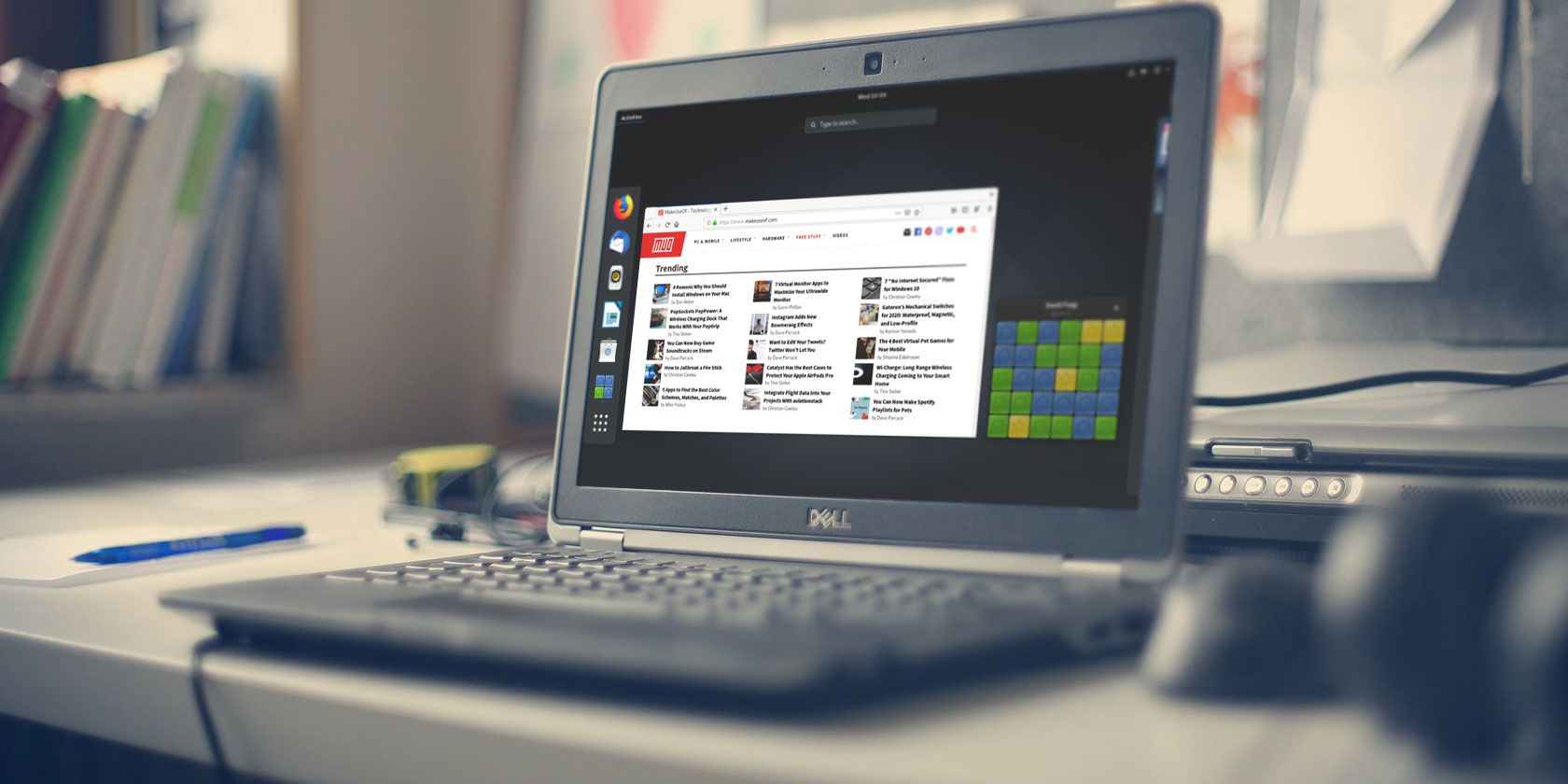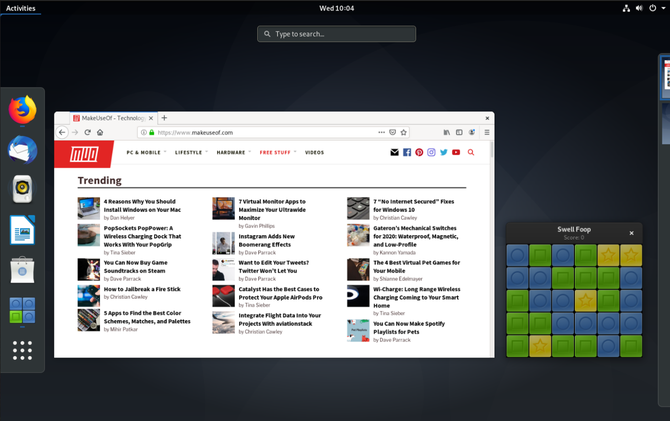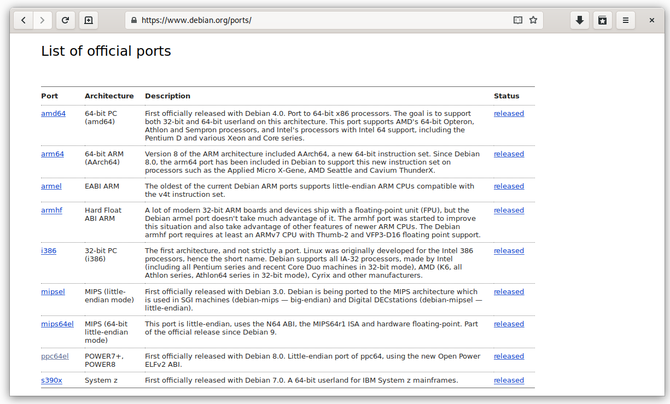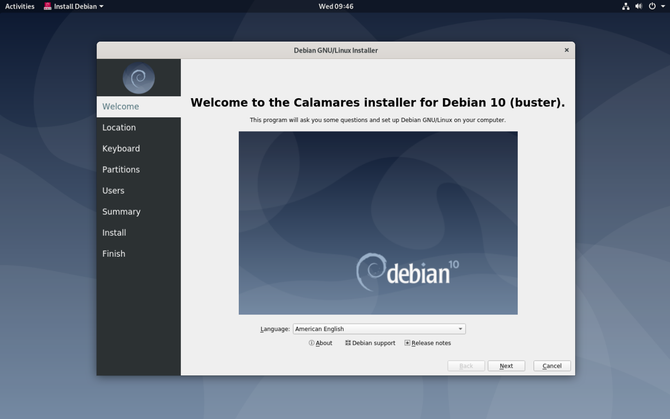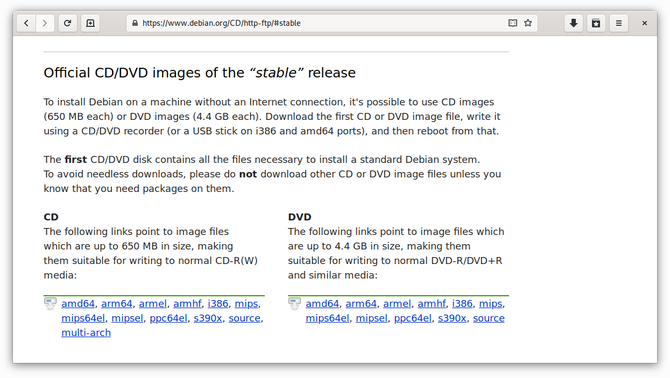Debian is one of the oldest and most established Linux distributions in the free and open source world. It also serves as the foundation for Ubuntu, the most popular version of desktop Linux.
Millions of people use a version of Linux based on Debian, but what about Debian itself? Why might you want to install Debian directly?
1. Debian Is Stable and Dependable
People have different expectations when they use a Linux desktop. Some want the latest version of software as soon as possible, even if that means dealing with a higher risk of crashes or bugs. Others just want their PC to work and to be reliable.
Debian is well-known for its stability. The stable version tends to provide older versions of software, so you may find yourself running code that came out several years ago. But that means you're using software that has had more time for testing and with fewer bugs. You can open your computer on a daily basis with a low likelihood of any surprises.
2. You Can Use Each Version for a Long Time
Debian doesn't have a regular release schedule. New versions come out when they're ready, which tends to be around every two to three years. The gap tends to be even longer than the long-term support versions of Ubuntu.
This may sound like a negative, but whenever you upgrade from one version of an operating system to another, you run the risk of software breaking. This is the case regardless of whether you're using Linux, Windows, or macOS. You also have to deal with the downtime required for your computer to download and upgrade all the necessary bits. With fewer releases, you can use Debian for a longer period of time.
3. Debian Is Ideal for Servers
With stable software and long release cycles, Debian is one of the many great Linux distros that can power your server. You don't need to search for a separate version of Debian either. You can simply opt not to install a desktop environment during installation and grab server-related tools instead.
Your server doesn't need to be connected to the web. You can use Debian to power your own home server available only to computers on your Wi-Fi network. If you combine it with Nextcloud or OpenMediaVault, you have yourself a handy cloud replacement.
4. A Rolling Release Option Is Available
Stable, time-tested software is great, but many of us want the latest versions of software on our PCs. When apps and interfaces gain new features, waiting several years for them to come to Debian is longer than many of us are willing to do.
Fortunately there are multiple versions of Debian to pick from. While Debian Stable is multiple years out of date, it's not the only version available. If you opt for Debian Testing, Unstable, or Experimental, you can choose the balance between stability and having the latest features that you're most comfortable with.
With Debian Unstable or Experimental, rather than wait for new versions of Debian to launch, you get to use one continuous version that regularly receives updates for apps and components as they're available. That makes Debian a rolling release distro that's easier to install than alternatives like Arch Linux.
5. Debian Supports Many PC Architectures
When you first switch to Linux, the most important question is whether you can even install the distribution. For example, if you have a Mac with a PowerPC processor rather than Intel, your options are more limited. Even with Intel hardware, if you have an older 32-bit machine, many Linux distributions will no longer work.
Debian provides installers for a wide range of architecture. You can run Debian on 32 and 64-bit Intel computers. Support is also available for 64-bit PowerPC machines. Want to run Linux on ARM or MIPS? Debian does that too.
6. Debian Is the Largest Community-Run Distro
Many people are drawn to Linux because of the free software culture. The GNU operating system has shown that code can be developed, shared, and maintained without a profit motive driving the creation. Yet that doesn't mean that companies aren't part of the equation. Many of the most popular distributions (Ubuntu, Fedora, openSUSE, elementary OS) have a company steering the project.
Debian is different. Debian is a massive community-run distro. There is no single company driving Debian's creation, maintaining its infrastructure, or steering the project's direction. If this is an arrangement you trust to keep the project free, or one that more aligns with your values, then it may be reason alone to stick with Debian.
7. Debian Has Great Software Support
Debian's DEB format, thanks in large part to how many people use Ubuntu, is now the most common app format in the Linux world. While not all DEBs that work on Ubuntu work on Debian, there's a good chance you will find DEBs for both.
Before you even start searching for third-party software, Debian has some of the largest software repositories you will find. With the exception of newer software, there's a good chance the open source app you're looking for is already there.
8. You Want to Be Close to the Source
Debian is not based on any other Linux distribution. That means that software available in Debian's repositories were packaged specifically for Debian.
For contrast, consider Linux Mint, a distro based on Ubuntu, which is based on Debian. When you install an app, you may be two layers removed from the source. Some Ubuntu software has tweaks, but much of it is the same as it ships in Debian. If you don't want to deal with figuring out where in the chain a bug appeared, running Debian can save yourself the hassle.
9. You Can Install a Free Software-Only Version
When you install most Linux distributions, closed proprietary binary blobs come as part of the kernel. If you have a computer that doesn't need such code to function, you may not want to add these unnecessary black boxes to your operating system. Debian is the largest Linux distribution that doesn't install this firmware by default. If you want it, you have to opt in.
The same is true of Debian's app repositories. If you stick to the defaults, you won't accidentally install any proprietary code on your computer. This is why Debian serves as the base for several Free Software Foundation-endorsed Linux distributions, such as Trisquel and PureOS.
10. Few Linux Distros Have Lived as Long as Debian
Debian has been around since 1993. That's only two years younger than Linux itself. Hundreds of Linux distros have come and gone over the years, before Debian has stood the test of time.
With so many distros existing as part of the Debian family, there are millions of people invested in this project continuing to exist. That alone is a good reason to stick with Debian.
11. You Don't Need a Strong Internet Connection
Linux makes software free and accessible, but most distros assume you have access to a solid internet connection. I know firsthand how limiting of a factor this can be. I had dial up when I first discovered Ubuntu, which made the idea of having to get all of my apps via downloads somewhat daunting.
Debian provides a DVD version that includes much of the software you can download from the repositories. This way you can download Debian somewhere where you do have unlimited internet access and set up your computer at home or the office later. You can also purchase CDs or DVDs for a low price and have them shipped to you.
12. Debian Is Desktop Agnostic
Many Linux distros choose a preferred desktop environment. You're free to swap this interface out for another, but you're no longer getting the supported experience.
Debian doesn't have any strong preferences. While there is a limit to the number that are available as Live CDs (those are GNOME, KDE, LXDE, Xfce, Cinnamon, and MATE), Debian doesn't give any of these desktops any more support or polish than the many other desktop environments available in the repositories.
Debian Is One of the Best Linux Distros Around
Whether or not we install Debian directly, most of us who run Linux use a distro somewhere in the Debian ecosystem. The project's reach is broad and impacts millions of people.
To recap, here are 12 reasons why many choose Debian:
- Debian Is Stable and Dependable
- You Can Use Each Version for a Long Time
- Debian Is Ideal for Servers
- A Rolling Release Option Is Available
- Debian Supports Many PC Architectures
- Debian Is the Largest Community-Run Distro
- Debian Has Great Software Support
- You Want to Be Close to the Source
- You Can Install a Free Software-Only Version
- Few Linux Distros Have Lived As Long As Debian
- You Don't Need a Strong internet Connection
- Debian Is Desktop Agnostic
That's not to say that Debian is for everyone. If you want to consider your options, here are other great Linux distros to try out.

